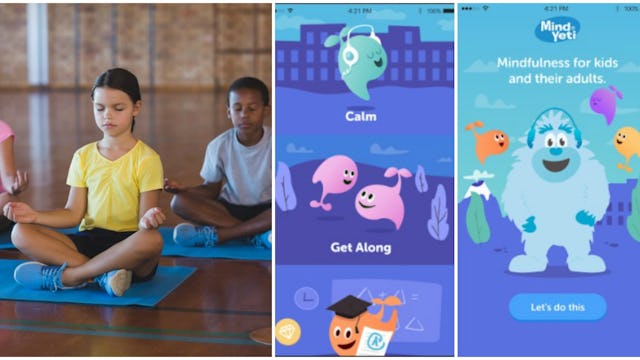Socio-Emotional Learning Is Vital, And This Mindfulness App Can Help

“Socio-emotional learning” is a buzzword you may have heard floating around lately.
In a nutshell, it refers to a set of skills that children need in order to thrive in school, relationships, and in society. You know, things like being attuned to their emotions, learning how to handle them—and likewise having empathy for others’ feelings, and interacting in cooperative and communicative ways. Oh, and having a sense of morality, and being able to make decisions based on safety and ethics.
These days, it seems like many grown-ups I know could use a crash course in socio-emotional learning too, but all joking aside, nurturing your child’s socio-emotional learning is everything and cannot be ignored. In fact, some experts believe that we need to pay more attention to our kids’ socio-emotional growth than things like academic greatness or other outward successes.
Mia Doces is an educator, counselor, and media specialist who works for Committee for Children, a global leader in socio-emotional education. Her department, New Mission Ventures, specializes in creating tools to help educators and parents extend socio-emotional learning beyond the classroom. She tells Scary Mommy that it really is vital that we focus on our kids’ socio-emotional learning—and that maybe our focus needs to shift away from their grades, academic standing, or other accomplishments.
“Multiple studies have shown that students who’ve had instruction in social and emotional skill building not only do better academically (11 percentage points higher) but also have better behavior and are better able to manage stress and depression,” says Doces. “Furthermore, benefits are long-lasting, with positive impacts on future education, employment, relationships. Additionally, having these skills and competencies reduces the risk of mental health issues, substance abuse and criminal activity.”
That’s some pretty compelling stuff right there. And if you think about it, it makes perfect sense. Kids can have perfect grades, engage in a zillion extra-curricular activities, and go to a top-notch college, but if they can’t function emotionally or interpersonally, there is no way in hell they will have a successful or functional life down the road.
So what can teachers and parents do to nurture their kids’ social and emotional well-being?
It’s all about paying attention, listening, modeling these healthy behaviors within yourself—and also providing your kids tools that help them get in touch with their emotions, and learn how to control them. These days meditation (at home and school) is all the rage—and with good reason. Meditation is a simple, inexpensive way for kids to become more mindful of their emotions, which is the first step in learning emotional regulation.
Doces and her team have come up with several programs to help kids become more mindful and socially and emotionally skilled. Probably the most popular and user-friendly one is an app called Mind Yeti, which is a meditation tool that can be used for kids of all ages, starting as early as four years old. The meditation sessions combine storytelling, breathing techniques visualization, and even some mindful movement for kids.
New Mission Ventures
Doces tells Scary Mommy that the developers of Mind Yeti made sure to make the app appealing to kids’ sensibilities, including sounds and images that kids can relate to and are part of their real lives—like the sound of the radiator in their home, video games noises, and imagery like a traffic light and a tree on a busy city block. The app can help with things like falling asleep, focusing on schoolwork, and can even be used as an alternative as to “time-outs” when kids just need to re-group themselves and calm down.
Sounds pretty fantastic, huh? My kids and I have listened to a few of the meditations on the app, and although we giggled through them at first, afterwards my kids said they actually helped them feel calmer—and they asked for more. I consider that a win.
You can access Mind Yeti’s free content at www.mindyeti.com or for iOS in the app store (the Android native app is coming soon).
But whether you use Mind Yeti or any other tool or idea out there to help your kids manage their big feelings, we could all use a gentle reminder that focusing on our kids’ socio-emotional health and learning isn’t just an optional thing you can do on the side. Really, it’s the priority.
One last thing: meditation and mindfulness are super-helpful tools to help your child manage their emotions, but they are not the only ones. If your child is having serious problems managing their emotions, is prone to frequent outbursts, is having issues dealing with peers, or is showing signs of depression, anxiety, or anything else, professional help (from a doctor, counselor, or therapist) is out there, and your child absolutely deserves it.
Bottom line: Don’t let this stuff go, or sit on the back-burner. Take your children’s socio-emotional and mental health as seriously as you take their physical health, their performance at school, and anything else. Our children are precious, and we need to start focusing on what’s going inside their little souls. It matters more than we realize.
This article was originally published on